March 4, 2022, marks the debut of Springfield Armory’s Hellcat Pro. Think duty-size pistol performance, but smaller. Thinner. This pistol, like the original Hellcat, is just 1” thick. You can get all three fingers around the grip frame of the 15-round 9mm pistol to stabilize the pistol as that other, almost all-important finger works the trigger. And the all-steel magazine contributes to the pistol’s overall slimness.
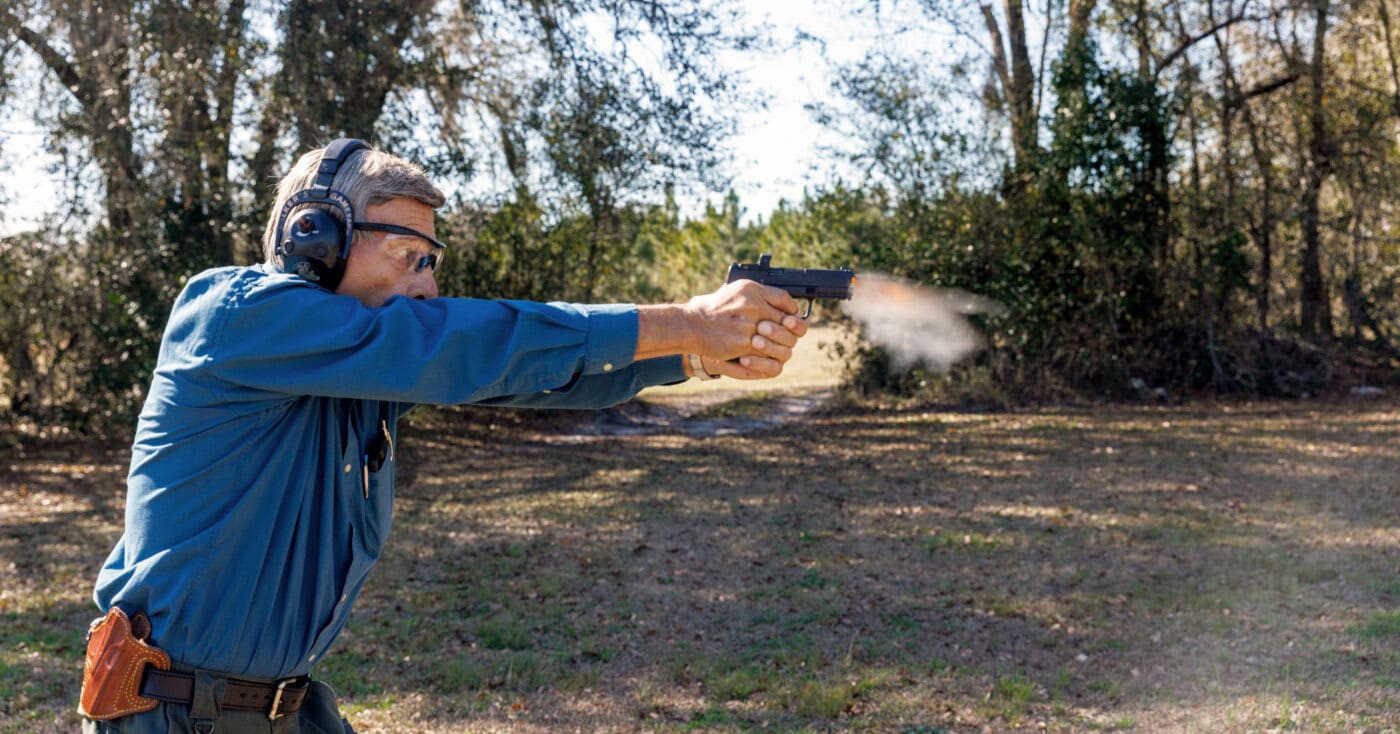
My test sample Hellcat Pro came fitted with the HEX Wasp red dot optic that is sold separately. Nominally “1X,” it appeared to us that the image through the glass was a tiny bit smaller than actual target size, but that went unnoticed in actual shooting. As expected with a Hellcat, the desirable large U-notch rear iron sight was coupled with a bright yellow circle on the front post, in the center of which sat a bright Tritium night sight dot. Also, the self-adjusting red dot was an appreciated feature.
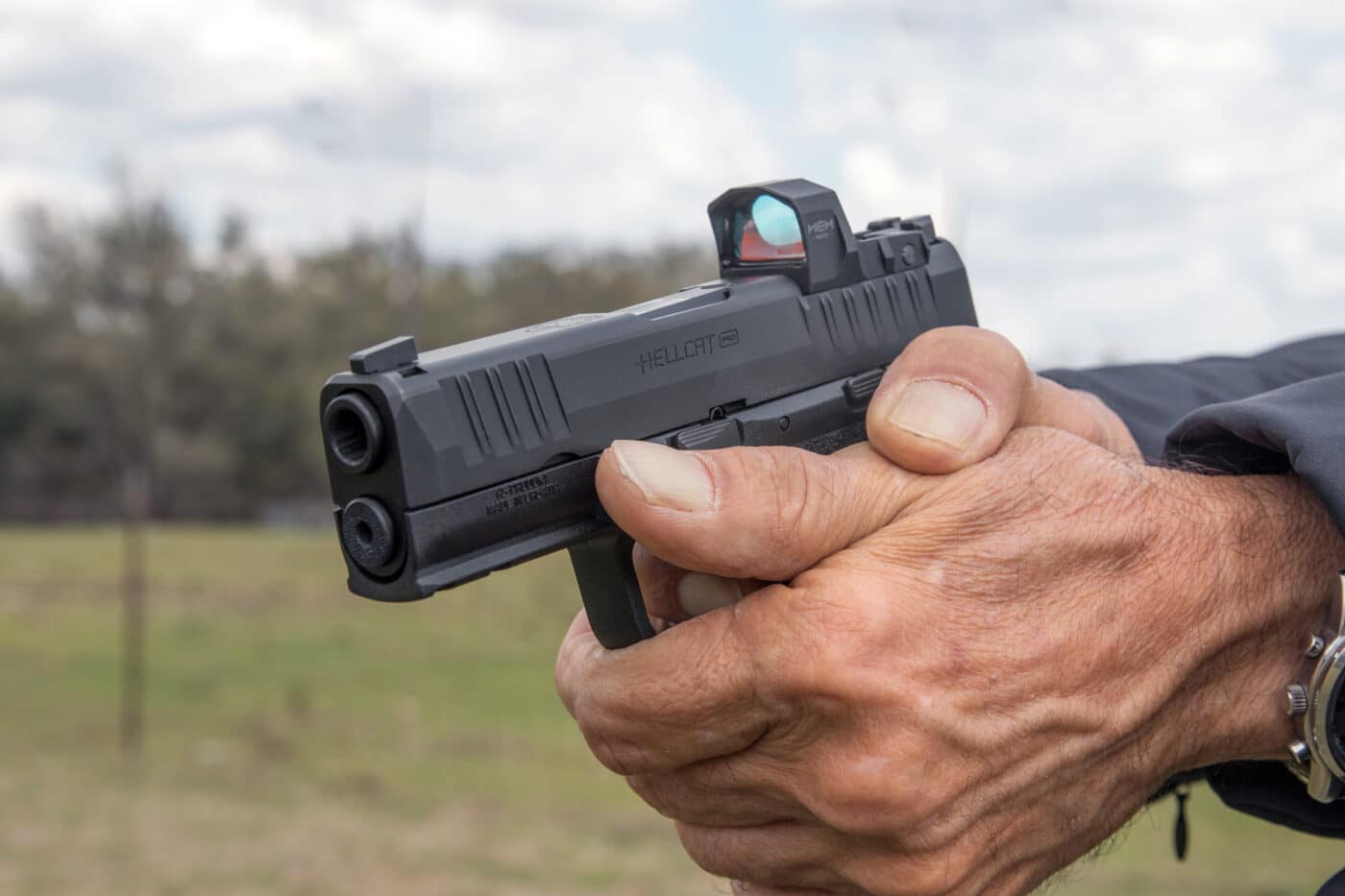
Like the original Hellcat, the Hellcat Pro has simple and easy-to-use controls. While the slide stop of the Hellcat Pro is not ambidextrous, the magazine button is reversible. This isn’t just for southpaws, who can do very fast reloads by pressing the mag release with their trigger finger instead of their thumb; it’s also useful for right-handed shooters who want to do the same thing. This right-handed tester has a thumb twisted by arthritis and has switched several of his pistols to right-hand buttons, but didn’t have to do so with this one: the compact dimensions of the Hellcat Pro allowed even that arthritic right thumb to hit the standard left-side release just fine.
The Hellcat Pro also has an accessory rail on the dust cover and functional grasping grooves both fore and aft on the slide. I don’t care for a forward grasp of a slide, but lots of people do, and this feature gives the shooter the option.
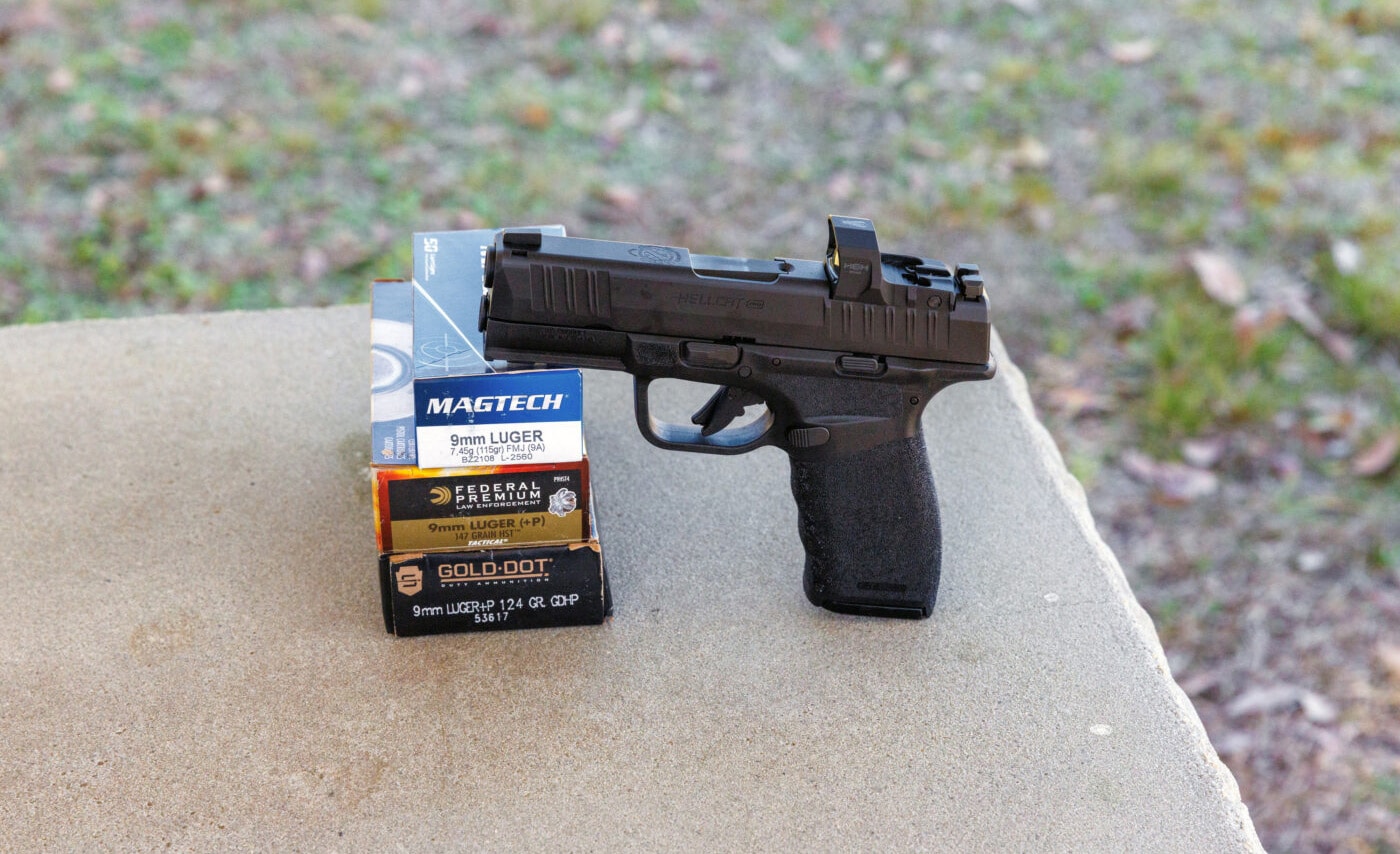
Essentially the original, super-popular Hellcat enlarged, the Pro has an excellent grip shape that locked into the hollow of this tester’s palm, with “just right” stippling around the entire grip frame. Trigger reach was such that an average-size adult male hand found the natural trigger contact point to be the “power crease” at the distal joint of the index finger.
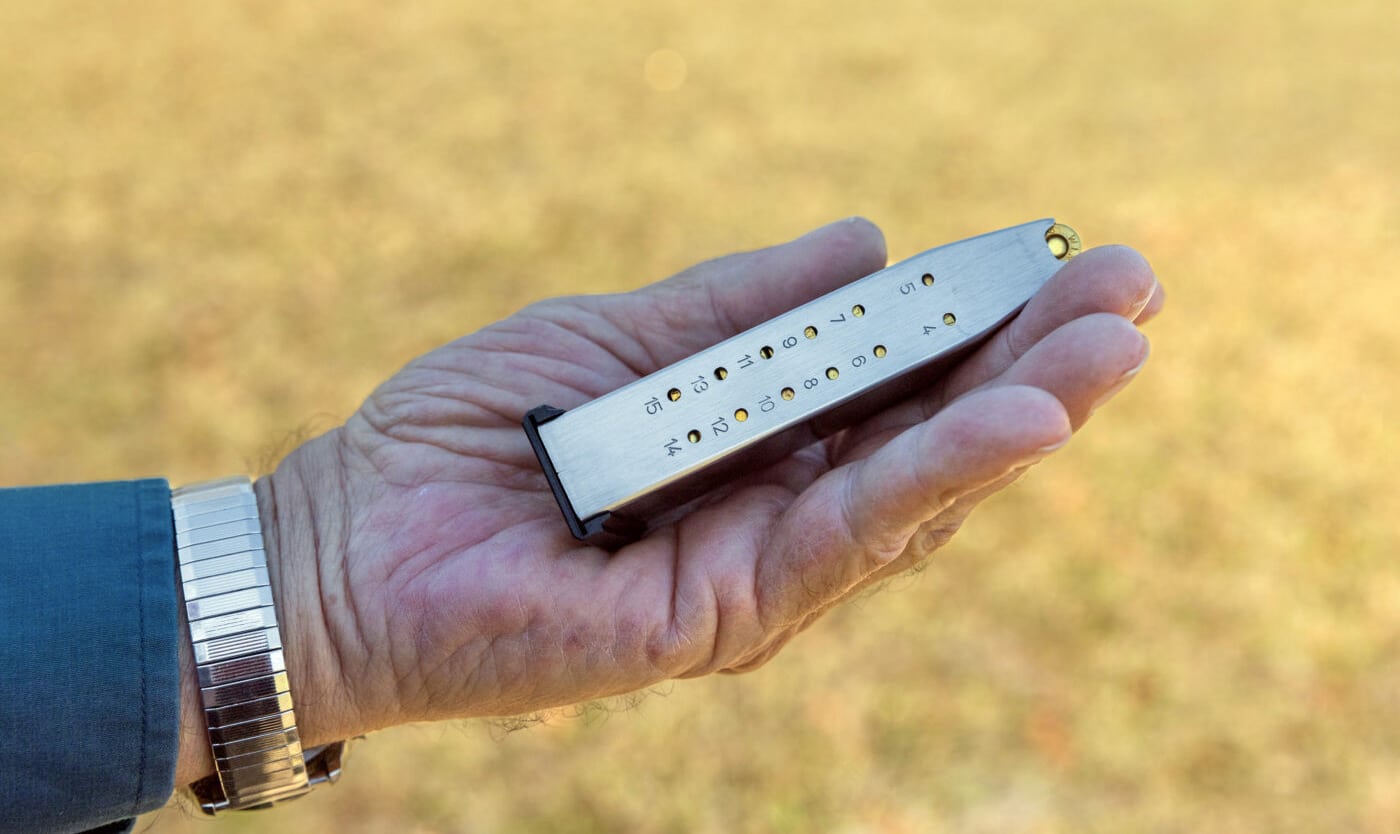
“Power crease” is a term coined by double-action revolver shooters for the sweet spot where the index finger has maximum leverage on the trigger. As a result, the trigger pull requires less shooter effort and thus “feels lighter” than it actually weighs out. This short reach dimension means that even shooters with very short fingers should be able to get the oft-recommended “pad” of the index finger centered right on the face of the Hellcat Pro’s flat-ish trigger.
Trigger Control
I paid particularly close attention to the trigger on the Hellcat Pro, as a good one can make all the difference. Once the intended shot was begun, our pre-introduction sample (serial number BB113097) had a relatively short, light take-up before the finger met what shooters call “the wall,” the first firm resistance to the press. Then followed a short “roll” and finally, a clean break with no “backlash” or post-release trigger movement that I could feel. Reset was very palpable.
Trigger pull was measured at the toe (bottom tip) of the pivoting trigger, where the measuring device has the most leverage, and again from the center of the trigger where the human finger is typically positioned during firing. The Lyman digital trigger pull gauge revealed an average pressure of 5.19 pounds at the toe, and 7.19 pounds at the center. In hand, it felt lighter than that to virtually everyone on the test team. The reason, I suspect, is that nicely short Hellcat trigger reach: it allows the shooter to get the finger deeper into the trigger guard, thus giving the shooter more leverage and creating the felt sensation of an easier, lighter pull.
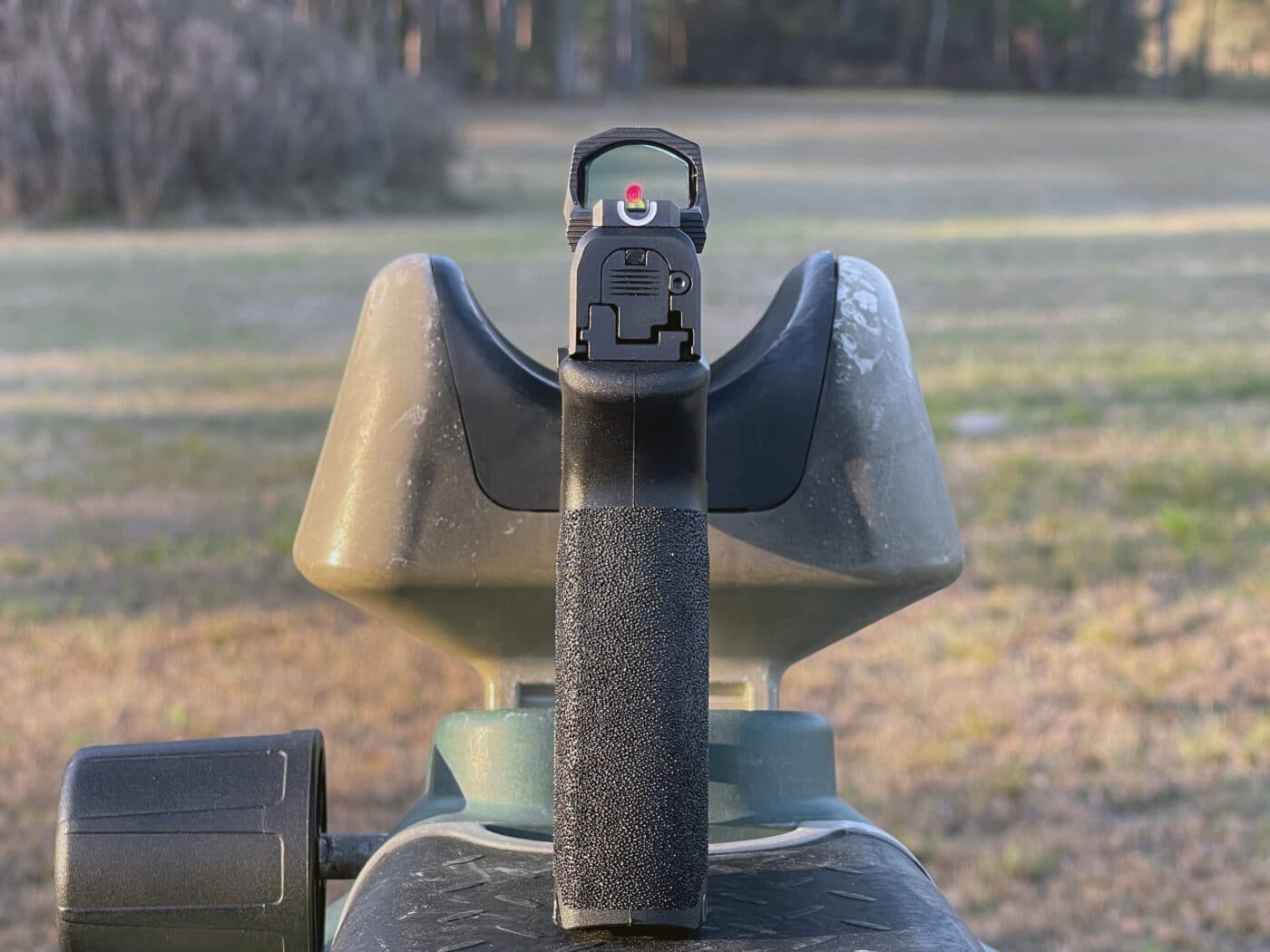
On the Firing Line
Our editor thought readers would like to know what 9mm velocities were from the newest Hellcat’s 3.7” barrel, so my colleague Steve Denney set up his Chrony F-1 on my range, 15’ from the shooting bench. We ran the three most popular bullet weights in 9mm.
Speer Gold Dot 124 grain +P bonded JHP averaged 1166.6 feet per second, with a standard deviation of 32.
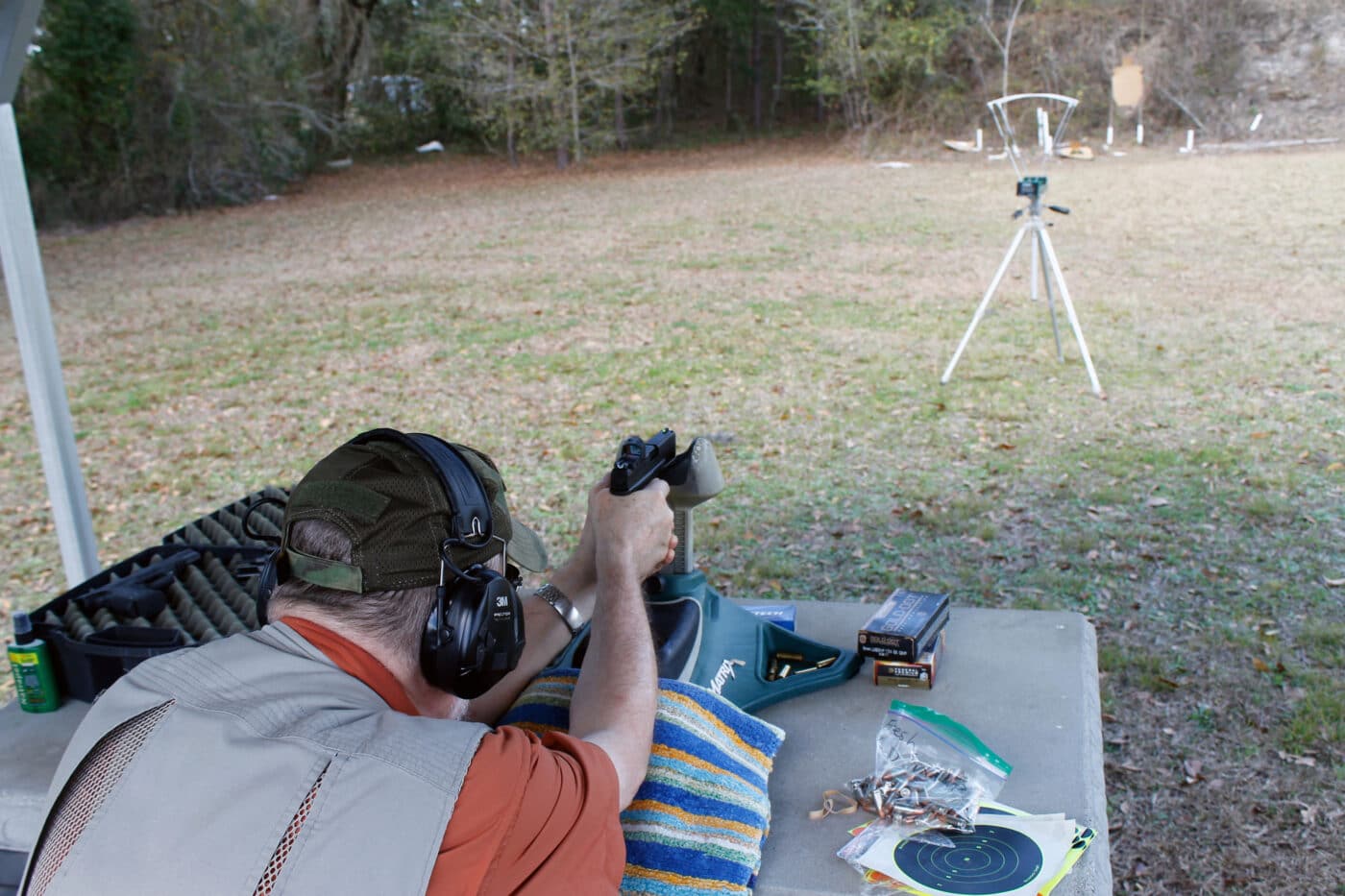
The most popular 9mm training load is 115-gr. FMJ, and MagTech’s well-reputed version of that load averaged 1133.6 foot-seconds, with a standard deviation of 15, supportive of that product’s reputation for consistency.
147 grain subsonic carry loads are very popular in the US and Canada, and Federal’s HST has earned an excellent reputation. We used the +P version, which averaged 1006.2 feet per second, with the lowest standard deviation: 12, with a low of exactly 1000 fps and a high of 1012.
| Ammunition | Group Size | Velocity |
| Federal HST 147 gr JHP +P | 0.45″ | 1,006 fps |
| MagTech 115 gr FMJ | 1.75″ | 1,134 fps |
| Speer Gold Dot 124 gr JHP | 1.05″ | 1,167 fps |
We used the same three loads for accuracy testing, from a Caldwell Matrix rest on a concrete bench 25 yards from the target. Each five-shot group was measured once overall (to give an idea what an experienced shooter can expect under ideal conditions) and then again for the best three hits (to weed out enough unnoticed human error for a good approximation of mechanical accuracy capability).
The 124 grain Gold Dot +P 9mm load, proven on the street by ICE, NYPD, and Las Vegas Metro played well with the Hellcat Pro, delivered a five-shot group that measured 2.40” center to center, with the best three more than twice as tight at 1.05”.
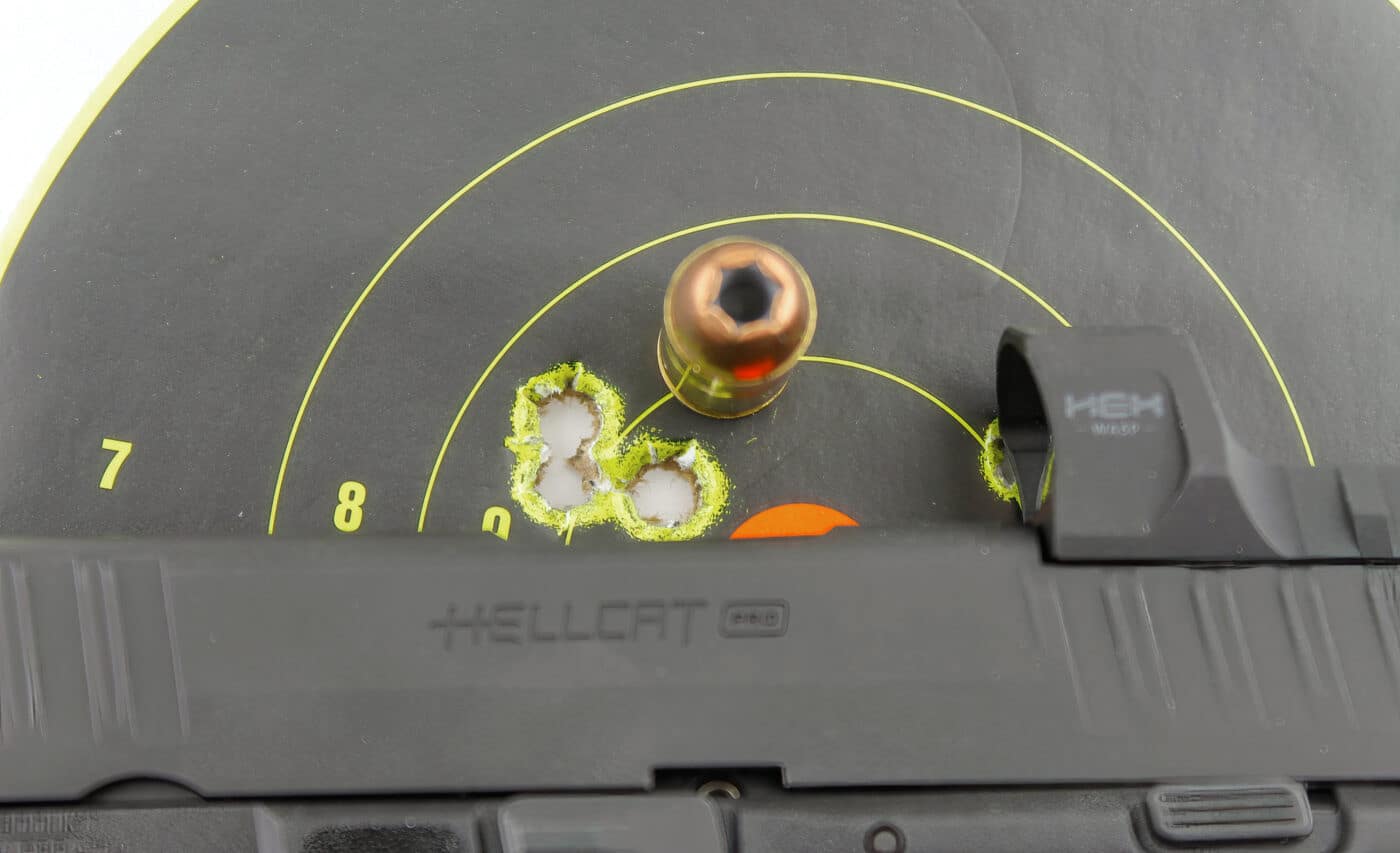
Relatively inexpensive MagTech full metal jacket ball gave us a 3.15” measurement for all five 25-yard shots. The best three were in an inch and three quarters. All measurements were center to center between the farthest bullet holes being measured, and to the nearest 0.05”.
147 grain HST +P, a popular and highly rated duty hollow point, had the largest five-shot group but the tightest “best three,” which I think validates the dual measurement concept. The whole group was 3.50”, but the best three hits were in a tight cloverleaf measuring less than half an inch center to center, 0.45” to be exact. That’s right: all three shots would have hit a single .45 bullet facing point of aim.
For perspective, the commonly quoted figure is “five shots in four inches at 25 yards is acceptable accuracy for a full-size service pistol.” Though technically a “compact” and not “full-size service pistol” in size, the 3.7”-barreled Hellcat Pro easily met and exceeded the “service pistol” accuracy standard.
Initially, the gun wasn’t sighted for my eyes and hit a bit to the right, though it was “on” for elevation. Fortunately, the HEX Wasp carry optic sight is adjustable. Easy fix by users.
Hellcat Pro Specifications
Here are the specs on the new Springfield Hellcat Pro pistol:
| Chambering | 9mm |
| Barrel | 3.7″ |
| Overall Length | 6.6″ |
| Weight | 21.0 oz |
| Sights | U-Dot |
| Grips | Integral, polymer |
| Action | Striker-fired |
| Magazine Capacity | 15+1 |
| MSRP | $634 |
Important Features
Like some other Springfield Armory pistols, the Hellcat Pro has a potentially life-saving feature I think its manufacturers should advertise more than they do. If the muzzle has to be pressed directly against firm resistance for a self-defense shot, it will not go out of battery and fail to fire as most semi-automatic pistols will. This is because the design of its particular full-length recoil spring guide rod creates a “stand-off effect” for a press contact shot, whether it’s a bear or a bear-hugging attacker that’s on top of the shooter.
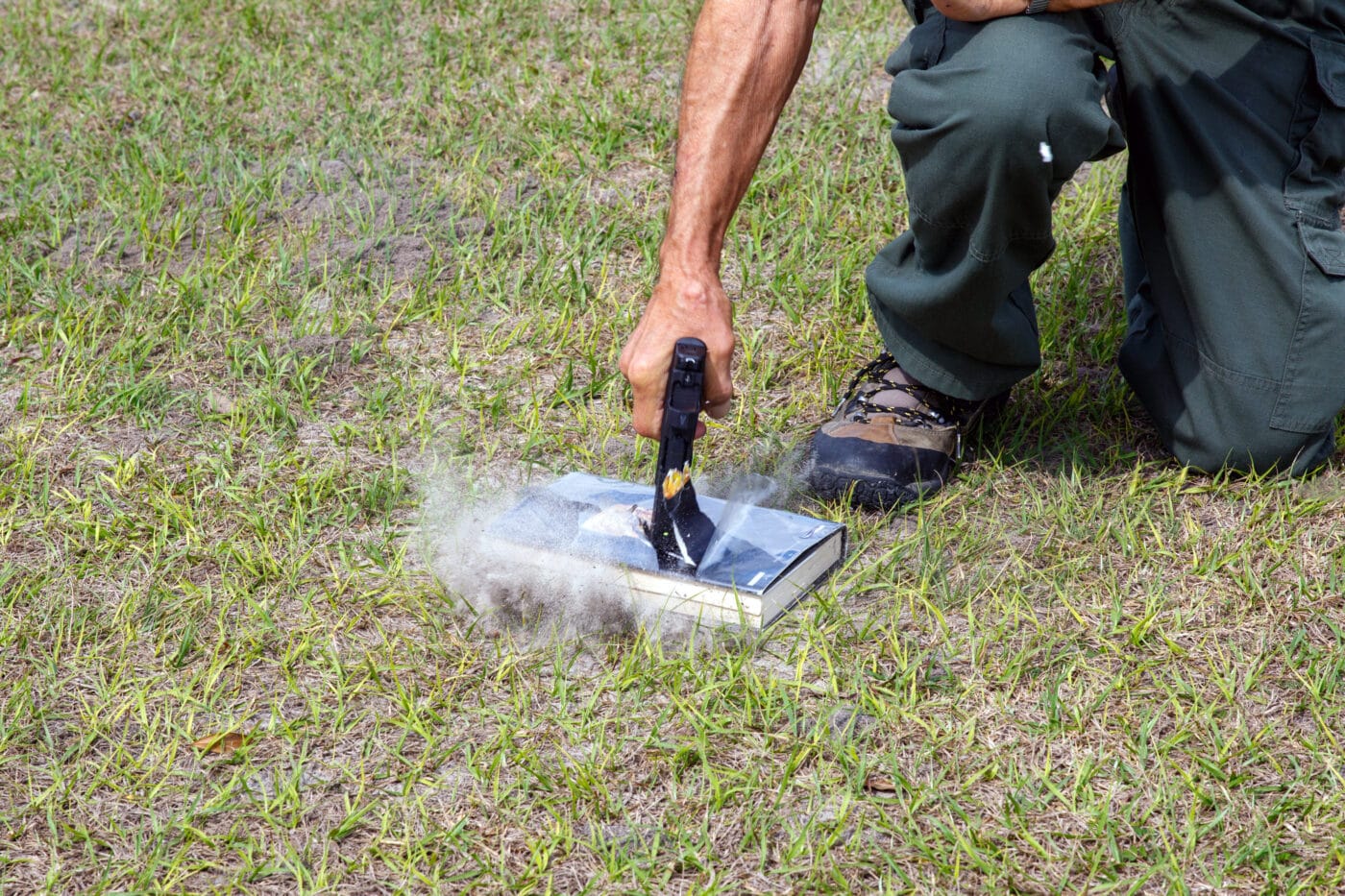
Another safety feature in my opinion is the little depressed, stippled “touch pad” on either side of the frame’s dust cover, which gives the shooter a felt index for placing their trigger finger when in a “ready” position. It turns out also that for those shooters who prefer a two-hand firing grasp involving straight thumbs, this is also an excellent resting point for the thumb of the support hand. It keeps that thumb from wandering upward and pressing against the slide, which could interfere with the firing cycle and jam one’s own self-defense pistol.
Bottom Line
Due to the pre-introduction non-disclosure agreement, I could only put the test gun into seven testers’ hands, and as respective schedules turned out only three of them got to shoot it with live ammo. About the only complaint was that it took strong thumbs to get the last couple of rounds into the magazines (it comes with two), but I suppose that’s why Springfield Armory includes a magazine loading tool. However, insertion of full magazines was positive even with the slide forward.
We put several hundred rounds through it – one hand only with either hand, various two-hand stances, and even intentionally limp-wristing – with shooters ranging from five-foot-tall female to six-foot-plus male with proportional hands. There were no malfunctions. Those who shot the Hellcat Pro gave it a unanimous thumbs-up.
Your broad range of choices in striker-fired compact 9mm self-defense pistols just got broader. This particular choice has a lot going for it.